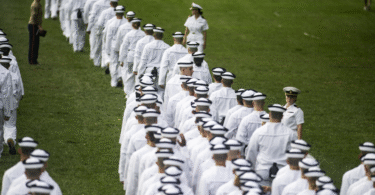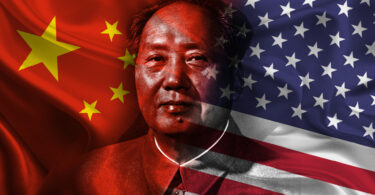By Col. Ron Scott, PhD, USAF ret, USAFA ’73
STARRS President & CEO
Dear General _____,
This is just a quick note to let you know I received your letter with attachments. I am honored that you took the time to reach out to me–I have always admired your contributions to our military and our Nation. Two of your books have prominent places on my bookshelf, and I have recommended them to others.
It is unfortunate that we appear to have contrary views on the state of our military (and national) culture. Let me offer some thoughts.
Frustrated with the nationwide COVID lockdown and pining to get back on the golf course to improve my handicap, I snapped out of self-pity when a USAFA classmate alerted me to a 3-minute video produced by Academy football coaches on July 7, 2020. Seven times they chanted “Black Lives Matter” and claimed five examples of racial injustice (all of them false).
The George Floyd incident had just occurred two months earlier–so sentiment was already at a fever pitch with riots and destruction taking place, with “mask exemptions,” across the entire nation. The coaches were seduced into the mob mentality obviously oblivious to the fact that the BLM founders were self-proclaimed Marxists.
Lt Gen Bishop (USAFA ’74) and I (and others) approached Lt Gen Jay Silveria, the Academy’s Supe at the time, with our concerns. He totally supported the video.
The day after the video was published, Silveria notified the Academy Family about “systemic racism” at the Academy and directed an assessment due to him no later than September 18, 2020.
I filed a Freedom of Information Act (FOIA) request for a copy of the assessment (we have filed 46 FOIAs, with minimal to no response and five pending appeals).
Three years later, it took a Judicial Watch lawsuit on our behalf to get a federal judge to compel the release of the document. Every page was inappropriately marked For Official Use Only (FOUO) to shield it from the public.
Of the 167 pages, 52 entire pages were redacted, not to mention significant redactions throughout the remainder of the report. In the unredacted portions of the report, there was no evidence of racial discrimination, let alone systemic racism.
What did the stonewalling accomplish?
During the time the report was shielded from the public, 90 cadets were trained to be diversity and inclusion officers and NCOs, two each per unit at the squadron, group, and wing level with a separate and parallel chain of command reporting to the Academy’s Chief Diversity Officer (our CIA counterintelligence member indicates how much that looks like a Soviet or Chinese political officer).
While we have discovered many, let me mention two other pieces to the indoctrination puzzle: MLDC and DACODAI.
The Military Leadership Diversity Commission (MLDC) was chartered by the Black Congressional Caucus without debate in the FY2009 National Defense Authorization Act. This occurred during the presidential election in the Fall of 2008. In March 2011, the MLDC published its final report with numerous recommendations. Here is a disturbing proclamation on p. 18:
Diversity management calls for creating a culture of inclusion . . . Creating this culture will involve changing the way in which people relate to one another within a single unit, within a particular military branch, and throughout the DoD.
In particular, although good diversity management rests on a foundation of fair treatment, it is not about treating everyone the same.
This can be a difficult concept to grasp, especially for leaders who grew up with the EO-inspired mandate to be both color and gender blind.
Blindness to difference, however, can lead to a culture of assimilation in which differences are suppressed rather than leveraged.
In other words, they admitted the intent to discriminate to achieve equity, and they turned the unifying concept of assimilation on its head.
With this effort and the fact that military leadership demonstrated it could illegally discriminate and get away with it, the following August 2011 the President issued Executive Order 13583 establishing diversity and inclusion manpower and programs throughout the entire federal government.
When SECDEF Austin learned not all of the MLDC recommendations had been implemented, he stood up the Defense Advisory Committee on Diversity and Inclusion (DACODAI) in the Fall of 2022. Ironically, the same individual, General Lester Lyles, chaired both enterprises.
Without going into a detailed history of STARRS involvement in an attempt to work with DACODAI, let it suffice to say, they were not interested in considering evidence that DEI has had an adverse effect on military readiness. DoD advances all kinds of “reasons” for recruiting problems–not one of them about ideological concerns associated with DEI.
I suspect you, like many, dismiss the Marxist connection because of a notion that Marxism relates to economic class warfare. Marx attempted this economic model because it fit within the historical context.
Yet, well before his 1894 Das Capital treatise, Marx was vetting and advancing his ideas about how to precipitate a revolution as an antecedent to an imaginary utopia. His (along with Engels) Communist Manifesto was circulated in 1848.
This document was predated by other material such as an 1843 letter exchange with Ruge (see https://www.marxists.org/archive/marx/works/1843/letters/43_09.htm).
Marx was set on destroying tradition and all the institutions associated with them.
Here is the text from the letter:
Letters from the Deutsch-Französische Jahrbücher
Marx to Ruge
Kreuznach, September 1843
I am glad that you have made up your mind and, ceasing to look back at the past, are turning your thoughts ahead to a new enterprise.[22] And so – to Paris, to the old university of philosophy – absit omen! [May it not be an ill omen] – and the new capital of the new world! What is necessary comes to pass. I have no doubt, therefore, that it will be possible to overcome all obstacles, the gravity of which I do not fail to recognise.
But whether the enterprise comes into being or not, in any case I shall be in Paris by the end of this month,[23] since the atmosphere here makes one a serf, and in Germany I see no scope at all for free activity.
In Germany, everything is forcibly suppressed; a real anarchy of the mind, the reign of stupidity itself, prevails there, and Zurich obeys orders from Berlin. It therefore becomes increasingly obvious that a new rallying point must be sought for truly thinking and independent minds. I am convinced that our plan would answer a real need, and after all it must be possible for real needs to be fulfilled in reality. Hence I have no doubt about the enterprise, if it is undertaken seriously.
The internal difficulties seem to be almost greater than the external obstacles. For although no doubt exists on the question of “Whence,” all the greater confusion prevails on the question of “Whither.” Not only has a state of general anarchy set in among the reformers, but everyone will have to admit to himself that he has no exact idea what the future ought to be. On the other hand, it is precisely the advantage of the new trend that we do not dogmatically anticipate the world, but only want to find the new world through criticism of the old one.
Hitherto philosophers have had the solution of all riddles lying in their writing-desks, and the stupid, exoteric world had only to open its mouth for the roast pigeons of absolute knowledge to fly into it. Now philosophy has become mundane, and the most striking proof of this is that philosophical consciousness itself has been drawn into the torment of the struggle, not only externally but also internally.
But, if constructing the future and settling everything for all times are not our affair, it is all the more clear what we have to accomplish at present: I am referring to ruthless criticism of all that exists, ruthless both in the sense of not being afraid of the results it arrives at and in the sense of being just as little afraid of conflict with the powers that be.
Therefore I am not in favour of raising any dogmatic banner. On the contrary, we must try to help the dogmatists to clarify their propositions for themselves. Thus, communism, in particular, is a dogmatic abstraction; in which connection, however, I am not thinking of some imaginary and possible communism, but actually existing communism as taught by Cabet, Dézamy, Weitling, etc.
This communism is itself only a special expression of the humanistic principle, an expression which is still infected by its antithesis – the private system. Hence the abolition of private property and communism are by no means identical, and it is not accidental but inevitable that communism has seen other socialist doctrines – such as those of Fourier, Proudhon, etc. – arising to confront it because it is itself only a special, one-sided realisation of the socialist principle.
And the whole socialist principle in its turn is only one aspect that concerns the reality of the true human being. But we have to pay just as much attention to the other aspect, to the theoretical existence of man, and therefore to make religion, science, etc., the object of our criticism.
In addition, we want to influence our contemporaries, particularly our German contemporaries. The question arises: how are we to set about it? There are two kinds of facts which are undeniable. In the first place religion, and next to it, politics, are the subjects which form the main interest of Germany today. We must take these, in whatever form they exist, as our point of departure, and not confront them with some ready-made system such as, for example, the Voyage en Icarie. [Etienne Cabet, Voyage en Icarie. Roman philosophique et social.]
Reason has always existed, but not always in a reasonable form. The critic can therefore start out from any form of theoretical and practical consciousness and from the forms peculiar to existing reality develop the true reality as its obligation and its final goal.
As far as real life is concerned, it is precisely the political state – in all its modern forms – which, even where it is not yet consciously imbued with socialist demands, contains the demands of reason. And the political state does not stop there. Everywhere it assumes that reason has been realised. But precisely because of that it everywhere becomes involved in the contradiction between its ideal function and its real prerequisites.
From this conflict of the political state with itself, therefore, it is possible everywhere to develop the social truth. Just as religion is a register of the theoretical struggles of mankind, so the political state is a register of the practical struggles of mankind. Thus, the political state expresses, within the limits of its form sub specie rei publicae, [as a particular kind of state] all social struggles, needs and truths.
Therefore, to take as the object of criticism a most specialised political question – such as the difference between a system based on social estate and one based on representation – is in no way below the hauteur des principes. [Level of principles] For this question only expresses in a political way the difference between rule by man and rule by private property. Therefore the critic not only can, but must deal with these political questions (which according to the extreme Socialists are altogether unworthy of attention).
In analysing the superiority of the representative system over the social-estate system, the critic in a practical way wins the interest of a large party. By raising the representative system from its political form to the universal form and by bringing out the true significance underlying this system, the critic at the same time compels this party to go beyond its own confines, for its victory is at the same time its defeat.
Hence, nothing prevents us from making criticism of politics, participation in politics, and therefore real struggles, the starting point of our criticism, and from identifying our criticism with them. In that case we do not confront the world in a doctrinaire way with a new principle: Here is the truth, kneel down before it! We develop new principles for the world out of the world’s own principles. We do not say to the world: Cease your struggles, they are foolish; we will give you the true slogan of struggle. We merely show the world what it is really fighting for, and consciousness is something that it has to acquire, even if it does not want to. [Ron’s note: this is why race consciousness is absolutely critical.]
The reform of consciousness consists only in making the world aware of its own consciousness, in awakening it out of its dream about itself, in explaining to it the meaning of its own actions. Our whole object can only be – as is also the case in Feuerbach’s criticism of religion – to give religious and philosophical questions the form corresponding to man who has become conscious of himself.
Hence, our motto must be: reform of consciousness not through dogmas, but by analysing the mystical consciousness that is unintelligible to itself, whether it manifests itself in a religious or a political form. It will then become evident that the world has long dreamed of possessing something of which it has only to be conscious in order to possess it in reality. It will become evident that it is not a question of drawing a great mental dividing line between past and future, but of realising the thoughts of the past. Lastly, it will become evident that mankind is not beginning a new work, but is consciously carrying into effect its old work.
In short, therefore, we can formulate the trend of our journal as being: self-clarification (critical philosophy) to be gained by the present time of its struggles and desires. This is a work for the world and for us. It can be only the work of united forces. It is a matter of a confession, and nothing more. In order to secure remission of its sins, mankind has only to declare them for what they actually are.
For America, its vulnerability to Marxist ideological infiltration can be traced to the Frankfurt School that took up residence at Columbia University in New York in the 1930s.
It updated Marx’s economic class struggle with political identity groups based on Critical Theory, which evolved into Critical Legal Theory, and most recently Critical Race Theory (the justification for the DEI praxis).
One of its disciples, Herbert Marcuse, would then play a major role in “training” disciples to infiltrate our institutions in the 1960s and beyond. Angela Davis was one of his prize students.
While the above ought to demonstrate a mere sample of the deeper research taking place by STARRS members, there is ample evidence to justify our concerns about the ideological radicalism that currently afflicts the DoD and our Nation.
At the risk of losing friends and receiving criticism, we are dedicated to preserving our Republic by bearing true faith and allegiance to our Constitution.
DEI is a mortal threat to our Constitution and the American way of life.
V/r,
Ron
Ronald J. Scott, Jr., Ph.D.
Colonel, USAF (Ret)
President and CEO
Stand Together Against Racism and Radicalism in the Services, Inc.








Great article Ron!